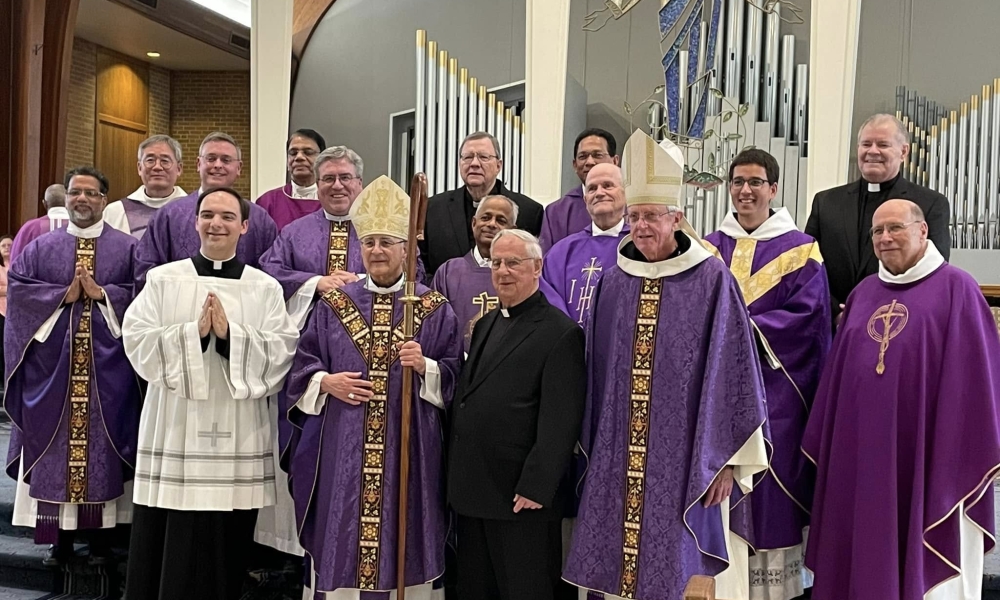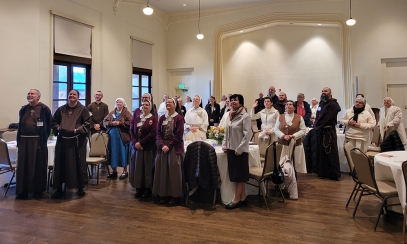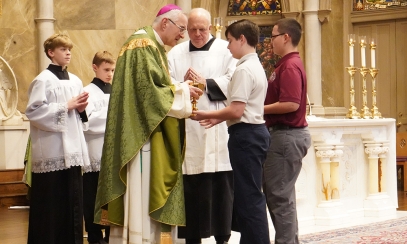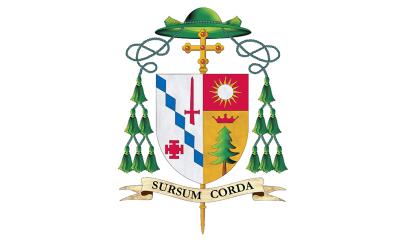
Pointing the way to Christ
Bishop thanks Father Mike Mac Mahon for his priestly ministry
Bishop thanks Father Mike Mac Mahon for his priestly ministry
On March 23, the bishop celebrated Mass at Holy Spirit Catholic Church in Huntsville, marking the retirement of long-time pastor Father Mike Mac Mahon. The complete text of his homily follows herein.
On March 23, the bishop celebrated Mass at Holy Spirit Catholic Church in Huntsville, marking the retirement of long-time pastor Father Mike Mac Mahon. The complete text of his homily follows herein.
My brothers and sisters in Christ, in a very special way today, we are here to give thanks to Almighty God for the life and ministry of Father Mike. We welcome in a very special way, Father Mike’s family from Ireland. What a blessing to have you come here! I take it you didn’t go through Heathrow? His hospitality is legendary, having welcomed me here 5 years ago. What a blessing it is to come to Huntsville and be greeted with such warmth every time I come. Sitting down for a meal with Father Mike enabled me to gain even greater insight into the warmth that he had in his heart; a shepherd’s heart that knew no limits. He loves being a priest of Jesus Christ! He loves the people he served in the various parishes throughout the diocese. He loves faith formation and Catholic education. Underneath it all, though, you’d find an Irish smile, a quip about something or other, a hearty greeting, a real human quality in which one could catch a glimpse of Christ in our midst. What is most important for him is one of his final acts as pastor here at Holy Spirit. He coordinated the building of a beautiful tribute to Our Lord in the Eucharist with a Blessed Sacrament Chapel that is known throughout the Huntsville region. Thank you, Father Mike: Holy Spirit Parish thanks you, your brother priests and clerics who are here thank you, and on behalf of Bishop Baker and myself, we thank you for your generous hospitality whenever we came here for an event or just a visit. We pray, that God hold you in the palm of His hand.
We are approaching the mid-way point of our Lenten pilgrimage. So, it is important not to forget or dismiss the original reasons with which we began our Lenten journey a few weeks ago. Each year, we have this “joyful” season to examine ourselves, engaging in a heart-to-heart talk with the Lord about our lives and making some constructive modifications that will enable us to live out our Christian lives more effectively and authentically.
Today, in our readings, I can only be moved by the encounter of Moses with God. In this rather remarkable event, the flaming shrub or bush is not consumed, and it speaks to Moses. In it, he recognized something extraordinary by the experience of a presence that cannot be quantified or explained in human terms. It was something real – very real! Yet, the event is chronicled for us to demonstrate persuasively the desire of God to reach out to humanity and, at the same time, the foundational desire of our humanity to reach out toward the divine and infinite – to reach out to God!
In our world, we have a strong desire to name things – to put order to them, to understand them. It seems quite natural for Moses to ask then, “What is your name?” (don’t we do that, too?!) so he could report back to the people what God had said. The voice emanating from the bush provides this mysterious response, “I am Who am. This is what you are to say to the Israelites: ‘I am has sent me to you.’” It’s both clear and unclear at the same time. It seems to me to be the very expression of a presence, of reality itself, of existence, and of being itself without beginning or end - “I am Who am.”
Whenever we encounter someone, there are expectations we have of how things will go and what the consequences will be. When something doesn’t match up to our expectations and hopes, we become disappointed, discouraged, and even upset. Moses’ experience with the Lord left him amazed, startled, surprised, and perhaps filled with a sense of awe and wonder, knowing that it could not be the full experience but only a part of one – a glimpse of something otherworldly. Yet, it was so real that he could only grasp a portion of it. Humbled, he removed his sandals as a form of respect and weakness to approach this amazing sight.
The Gospel passage continues to pick up on this theme in a different, remarkable way. This time it is the image of a fig tree in the orchard. I’m not too familiar with fig trees in Alabama, but I imagine there are few given the southern climate. Beyond “fig newtons,” it was only later in life that I came to experience the extraordinary juicy flavor of fresh figs. They have a delicious sweetness to them that make them a desirable fruit especially when they are in season. Certainly, in the Mediterranean areas, fig trees are prized and valued. So, when the fig tree doesn’t produce fruit, it may have reached the end of its usefulness, but you give it one more shot to see if it can still produce the cherished fruit.
For Italians, and for many cultures, fresh produce and fruit is a necessity, an expectation of life. My uncle John, my mother’s brother, who is also my Godfather had an amazing garden. He lived in northern Michigan. Cultivating a garden was a part of life. Tomatoes seem to be at the heart of the garden, but he produced results I had never seen before. Planted in the front of his house toward a southern exposure, his tomato plants reached beyond the roof of the house – all loaded with tomatoes. I had never seen such plants before. He had a whole row of them. He was awfully proud of those plants and the harvest of tomatoes were enjoyed most of the summer. In part, he attributed the growth of the plant to the sun, the warmth of being near the house, the cultivated soil, and some “fertilizer tea,” as he used to call the treated water that he used to water the plants with. Now my brother has started the same thing at home - tomato plants that go up the side of the house, producing an abundant harvest of tomatoes.
Here’s this fig tree. But even then, there is hope. Why should the fig tree be cut down? Shouldn’t the ground be cultivated and fertilized – helped along and given one more go? Then, if it doesn’t produce, cut it down.
Part of our Lenten journey is our mortification, our self-sacrifice, our penance for our sins, our interior desire to set things right with God and to acknowledge deep down our desire to conform our lives more and more to that of Christ.
Using the parable as a guide to our reflection today, and through an examination of our lives, we can see that the sins - deadwood, wrongs, hurts - can be turned into a source of new life. One spiritual writer put it this way: “In the deep pit opened by your humility, let penance bury your negligences, offences, and sins, just as the gardener buries rotten fruit, dried twigs, and fallen leaves at the foot of the very tree which produced them. And so what was useless, what was even harmful, can make a real contribution to a new fruitfulness. From your falls, learn to draw strength: from death, life.” It prepares us for the very experience of God’s presence – the burning bush.
All throughout our lives, it is easy to think we can run from God, ignore God, try to fool God by our attempt at giving excuses. But at each turn, we will find ourselves squarely before that presence that continues to shadow and hound us. Jesus was an extraordinary presence for those who met Him. He displayed His mastery over nature. He knows and understands us – understands our hearts and minds, even better than we do ourselves, seeing through the tangled web of our hearts. He has command over language and rhetoric to the point where even the police authorities who had been tracking Him report to their superiors, “No one ever spoke like this.” He identifies with our pain and suffering and our joys and hopes as He met more and more people. For them, He became the face of mercy: Someone Who understood the longings of their hearts. Someone, it seems, they were waiting for all their lives.
Father Mike shared in the joys and sorrows of life of his parishioners. And, because he did so, through him one could see Christ shepherding and guiding.
Now, it is this same person, Jesus Christ, Who proposes Himself to us, to our desires in every event and experience of our lives. Our prayer and penance and our works of charity during this season should help us to see Jesus more clearly in all we do and give us the confidence and certainty of the hope that Christ presents to us.
During this season, may we see Christ anew, experience His loving presence and mercy, and produce the abundant fruit that He promised us by staying close to the Him. It is a time of fulfillment, a time of hope, and a time of great expectation. “This is the acceptable time … this is the day of salvation.”
Thank you, Father Mike, for your pastor’s heart in which you have pointed the way to Christ for many here today.



